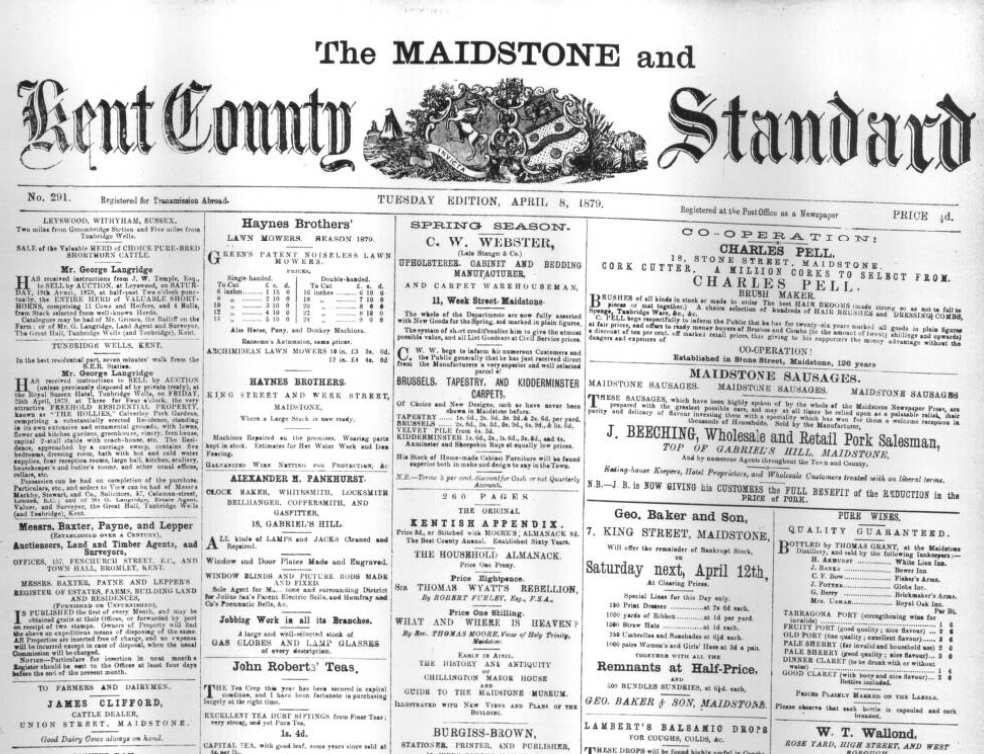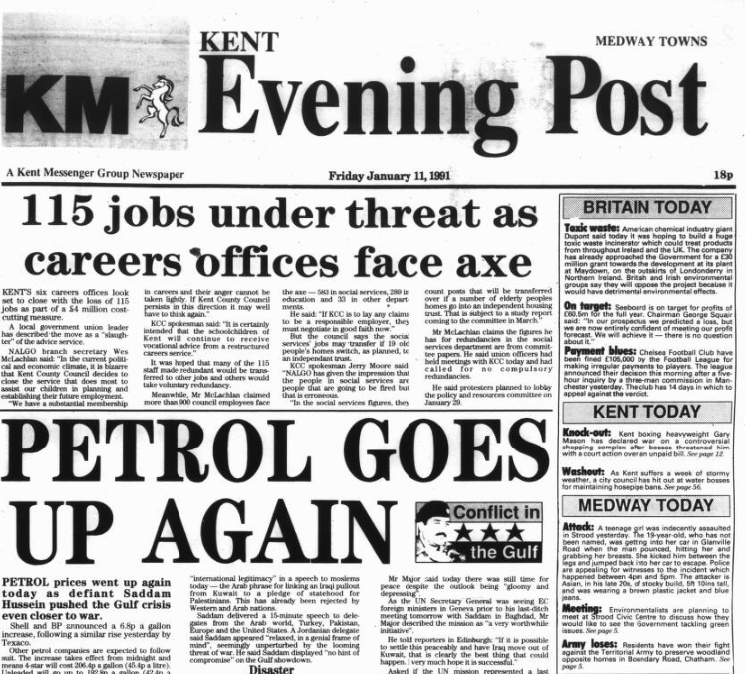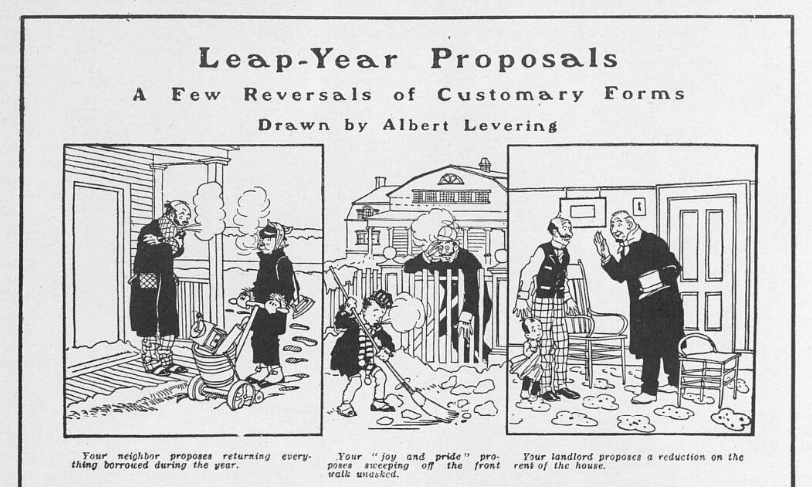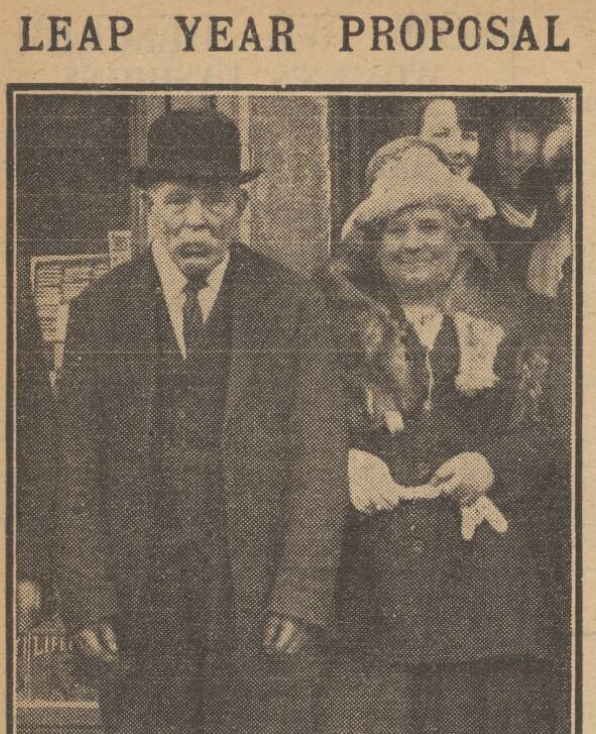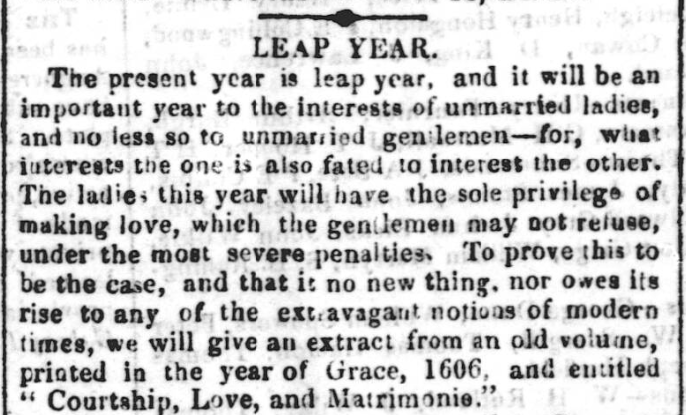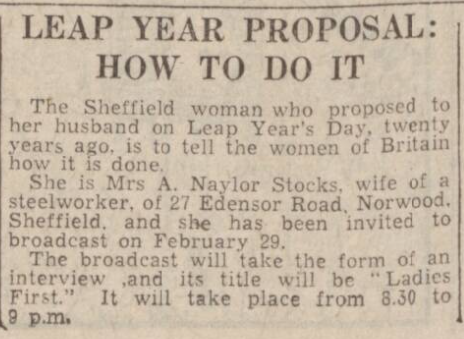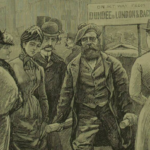This week at The Archive we marking the leap day of 29 February by adding 247,740 brand new pages, as well as examining the tradition of the leap year proposal. We’ve also added a duo of new titles, whilst we’ve updated 69 of our existing titles from across the world, from the United Kingdom, Ireland, the Channel Islands, the Caribbean, New Zealand and Hong Kong.
So read on to discover more about the tradition of the leap year proposal, our two new titles, both of which hail from Kent, and our global selection of updated titles.
Register now and explore the Archive
The first of our duo of new Kent titles is the Kent County Standard. Founded in the county town of Kent, Maidstone, in 1873, this title was politically Conservative and appeared every Saturday at the modest cost of just one penny.
Filling eight pages, the Kent County Standard featured ‘full news and well-written articles,’ and despite its Conservative ties, it asserted itself to be ‘conducted with impartiality.’ Furthermore, this publication was ‘one of the county organs, fully recognised and employed by the Kent magistrates, assembled in general sessions, for the publications of their official notices.’
A packed read, the Kent County Standard covered diverse news topics, from church to agricultural news, from sporting to political updates, from commercial to labour and capital information. The newspaper also extensively featured local news, reporting from the likes of Maidstone, Ramsgate, Canterbury, Chatham, Deptford, Margate and more.
Furthermore, the Kent County Standard printed an extensive section devoted to births, marriages and deaths, as well as a column devoted to accidents and offences.
Fast forward nearly a century later, and the second of our Kentish duo of new titles appeared on the publishing scene. This title was the Kent Evening Post, which was launched in the Kent town of Chatham in August 1968. Providing ‘local news everyday,’ the paper claimed to be the ‘first as always.’
At the start of the 1970s, in January 1970, the Kent Evening Post looked back at its first two years of publication, writing how:
Never has the superiority of the ‘Evening Post’ over all other local news media been so apparent as it is at the start of this new decade. When the Post was launched in August, 1968, local people had, for the first time, a newspaper which cared about their problems and interests.
The piece then went on to outline all the key points covered by the Chatham-based daily newspaper:
- A paper which gave them, every weekday, a full local news service, plus the major national and international news
- A paper which printed the most informative and entertaining feature articles
- A paper which gave unrivalled sports coverage
- A paper which provided a voice for local opinion and had the courage and imagination to fight causes rather than represent sectional interests or mouth personal prejudices
Fresh for the 1970s, the paper was set to be ‘printed on our new press at Larkfield – the most modern equipment in the country.’ It was announced that the new press would be opened by Conservative leader (and later Prime Minister) Edward Heath on 19 January 1970, and ‘the most noticeable impact of the change on our readers will be a much greater clarity in print and pictures.’
A lively read, the Kent Evening Post published an array of entertaining and informative features, from a health column to a family page, from the ‘Stray of the Day’ section to a leisure guide. The paper, which cost 6d in the early 1970s, ran until 1992 when it was rebranded as Kent Today.
That’s it from our duo of new titles, but before we take a look at the tradition of leap year proposals, we’d be amiss if we didn’t highlight our fantastic array of updated titles this week. The largest updates of the week are the over 19,000 brand new pages that we have added to the Lincolnshire Chronicle, whilst over 13,000 brand new pages join the Sunderland Daily Echo and Shipping Gazette.
Our updates, meanwhile, have a global flavour this week. We’ve added new pages to two of our Caribbean titles, namely the Dominica Chronicle and the Voice of St. Lucia. From the other side of the world, new pages join Hong Kong title the Overland China Mail, and from even further afield, we’ve made updates to New Zealand’s Lyttelton Times.
Closer to home, we’ve updated three of our Welsh titles (the Cambrian News, the Denbighshire Free Press and the Porthcawl Guardian). Likewise, we’ve added new pages to three of our titles from the Republic of Ireland (the Evening Irish Times, the Midland Tribune and the Munster Tribune), as well as to three of our titles from Northern Ireland (the Irish Weekly and Ulster Examiner, the Londonderry Sentinel and the Strabane Weekly News).
Meanwhile, we’ve added new pages to one of our Channel Islands titles, the Jersey Evening Post, and we’ve updated a lucky thirteen of our Scottish titles, including Orkney title the Orcadian.
A Leap Year Proposal
To mark this year’s extra day, we thought we’d delve into the old tradition of the leap year proposal, which allowed women to propose to men on one day every four years. The tradition has its roots in Irish folklore, stemming from the 5th century. The story goes that St. Bridget struck a deal with St. Patrick after complaining that women had to wait too long to be married, and St. Patrick decided that one one day every four years, the leap day, women could propose.
This Irish tradition was brought over to Scotland, and in England, it actually had a legal basis. And in the 1970s, when our new title the Kent Evening Post was published, the subject of the leap year proposal came up again, under the new lens of the women’s liberation movement and the 1972 leap year.
By this point in time the leap day window had extended to any time up until the 29th February, the leap day, as John Hoffam for the Kent Evening Post observed on 3 February 1972:
Does it matter who proposes marriage, the man or the woman? Traditionally, it is the privilege of the male, but every Leap Year by some quirk of Women’s Lib, the option is given to the female. From January 1 until February 29, any girl can buttonhole her boyfriend and pop the question.
On Valentine’s Day of 1972 Irene Phare for the Kent Evening Post looked at the differing attitudes towards the leap year proposal, penning how:
The Woman’s Lib attitude claims that a woman should be able to propose to a man if she feels like it, or turn her back on marriage with equal poise if she so desires. The average man’s view, that women should wait to be asked, because a man making a proposal has his traditional position to maintain…on his knees before the female. And the third group is those who are mutually contented with each other and drift into a perfect relationship without chalking up the score as they go along.
Looking at the leap year proposal before the 1970s in our newspapers, we found plenty of examples. Take 72-year-old Mrs. Lavinia Young’s proposal to 70-year-old Mr. Robert Maxwell in 1925, which was so noteworthy it found its way into the pages of national newspaper the Daily Mirror:
Mr. Robert Maxwell, aged seventy, and his bride, Mrs. Lavinia Young, aged seventy-two, after their marriage at Belfast Cathedral. Each had been married twice before. The bride on this occasion made a Leap Year proposal.
The Manchester Courier, meanwhile, in January 1908 tracked ‘the first public announcement of a Leap Year romance’ in its pages, which was made at the Welshpool Borough Sessions. The article described how:
…Mr. Woosman, solicitor, Newtown, applied for the transfer of a public house license to a barmaid, named Miss Lucy Parry. He said that, taking advantage of Leap Year, she had proposed and been accepted, and a fortnight hence would be wedded. The Bench granted the transfer to the prospective bride, who, together with her future husband, appeared smilingly in court.
One of the earliest mentions of the tradition of the leap year proposal we could find in The Archive came from the Dublin Observer on 9 January 1836. On account of 1836 being a leap year, the paper penned how:
The present year is leap year, and it will be an important year to the interests of unmarried ladies, and no less to unmarried gentlemen…The ladies this year will have the sole privilege of making love, which the gentleman may not refuse, under the most severe penalties.
Indeed, if the man were to refuse the proposal, there would be some act of recompense that he would be expected to perform.
Furthermore, the Dublin Observer printed an even older account of the leap year proposal tradition, taken from a 1606 work entitled Courtship, Love and Matrimonie:
Albeit, it is now become a parte of the Commun Lawe, in regard to the socieal relations of life, that as often as every besextile year doth return, the ladyes have the sole privilege, during the time it continueth, of making love unto the men, which they may do either by wordes or looks, as unto them seemeth proper; and moreover no man shall be entitled to the benefit of clergy who dothe refuse to accept the offers of a ladye, or who doth in any wise treate her proposal with slight or contumely.
Find out more about the leap year proposal, courtship traditions from history, and much more besides, in the pages of our Archive today.
New Titles
| Title | Years Added |
| Kent County Standard | 1875-1881, 1883-1890 |
| Kent Evening Post | 1970-1972, 1974-1980, 1985-1989, 1991-1992, 1995-1997 |
Updated Titles
This week we have updated 69 of our existing titles.
You can learn more about eah of the titles we add to every week by clicking on their names. On each paper’s title page, you can read a FREE sample issue, learn more about our current holdings, and our plans for digitisation.
You can keep up to date with all the latest additions by visiting the recently added page. You can even look ahead to see what we’re going to add tomorrow.


